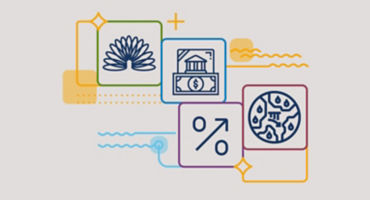- Global Investment and Multi-Asset Strategist
Skip to main content
- Funds
- Capabilities
- Insights
- About Us
Asset classes
The views expressed are those of the author at the time of writing. Other teams may hold different views and make different investment decisions. The value of your investment may become worth more or less than at the time of original investment. While any third-party data used is considered reliable, its accuracy is not guaranteed.
As of 14 March 2023
In a matter of days, the cumulative effect of US Federal Reserve (Fed) policy tightening has hit the US banking sector hard, beginning with the collapse of Silicon Valley Bank (SVB) on March 10.
Panicked depositors in several banks have since rushed to the exits, setting off a liquidity crisis and leaving some banks’ capital positions in precarious shape. The Fed and the US Treasury have taken swift steps to help stabilize the banking system by providing liquidity and assuring impacted depositors that they will be “made whole.” This past weekend, they unveiled several new facilities designed to ease the "liquidity crunch" and to prevent further bank runs.
However, growing investor concerns are sweeping the financial markets: Safe-haven assets have benefited, Fed rate-hike expectations have been all but extinguished, government bond yields are lower and credit spreads wider, and the US dollar (USD) has risen. Meanwhile, global equities are down, with small-cap stocks the big laggards so far.
The situation is evolving rapidly as we speak, as are the potential economic and market implications. At Wellington, we don’t always agree with each other, but we vigorously debate the issues and ramifications. Here are some key points from our latest internal discussions, highlighted by a common theme that there is now a greater probability of a US recession in the near term. Many of us also think investors should consider pivoting to a “risk-management mode” that favors higher-quality assets.
In the near term, I expect risk-off dynamics to dominate and less risky assets to outperform. Financials and other sectors tied to the economic cycle will likely struggle the most. I also expect large-cap stocks to outperform smaller-cap stocks and growth-style equities to outperform value in the short term. China and other Asian markets tied to China’s recovery are apt to outperform the US and Europe, in my view.
Longer term, I see investment opportunities. Notably, I think quality assets may still be rewarded over time — for example, large money-center banks that have ample capital and have been subject to stricter regulation than smaller banks. Also, some high-quality US fixed income assets may offer relatively attractive yields and total-return potential if the economy softens. A risk is that the Fed’s additional liquidity succeeds in averting a full-blown financial crisis but fans the flames of inflation, thus requiring more Fed rate hikes down the line. This is another reason I suggest favoring quality.
My bottom line: Until this all subsides, proceed cautiously, and be prepared to follow the “higher for longer” investment playbook for inflation and rates in your long game.
The speed and magnitude of the Fed’s “about-face” from easy to tight monetary policy was bound to expose firms caught on the wrong side of rising rates. That’s precisely what’s happening here, and with the broader financial system now caught up in the turmoil, systemic risks should not be taken lightly. However, the US banking system is generally strong, especially the large, well-capitalized banks, and US regulation is designed to deal with commercial bank failures. I believe the Fed and Treasury will respond decisively to avoid a worst-case outcome.
Expert

URL References
Related Insights

Time for bond investors to take the wheel?
Volatility makes bond investing less straightforward, but it can also create opportunities, provided investors are in a position to "take the wheel" in order to capitalise on them.

An active investor’s guide to growth equities
Our experts offer their view on the current economic environment, explore best practices for investing in high-quality growth equities, and highlight where they see opportunity now.

Massive market sell-off: Justified or an overreaction?
What's behind the global market meltdown, and what should investors consider doing? Global Investment and Multi-Asset Strategist Nanette Abuhoff Jacobson shares her views.

Time for credit selection to shine
Fixed income investors continue to seek answers to an era of volatile rates. Large, static exposures to credit markets no longer cut it. Instead, a nimble and dynamic approach is more likely to create resilient and consistent total return outcomes.
Three themes (and what they mean) for income investors
With several macro crosscurrents at play, Portfolio Manager Peter Wilke suggests that income-oriented investors not lose sight of the “big picture” in their quest for yield.

Credit market outlook: Expect greater opportunities in back half of 2023
Against a backdrop of elevated recession risks and banking-sector stress, Fixed Income Portfolio Manager Rob Burn identifies relative-value sector opportunities in the credit market.
Three macro assumptions that could be just plain wrong
Fixed Income Portfolio Manager Brij Khurana offers his non-consensus take on three entrenched, but potentially flawed, beliefs in today's market environment.
Wellington investor survey: The bears ponder whether inflation will be too hot, too cold or just right
Conducted prior to the collapse of Silicon Valley Bank, our latest quarterly survey of Wellington investors shows a majority of respondents being more bearish than the consensus view.
Understanding the US banking sector shake-up
Investment Communications Managers Jitu Naidu and Adam Norman detail recent US bank failures and analyze the implications. (Published 14 March 2023)
SVB collapse: What are the implications?
Multi-Asset Strategist Supriya Menon shares her latest perspectives on the collapse of Silicon Valley Bank Financial Group (SVB) and the unfolding implications for investors. (Published 14 March 2023)
Decoding the effects of deglobalization
Nicholas Petrucelli outlines the economic, political, and geopolitical underpinnings of deglobalization. He also demonstrates the impact this trend has today and analyzes the investment implications.
URL References
Related Insights